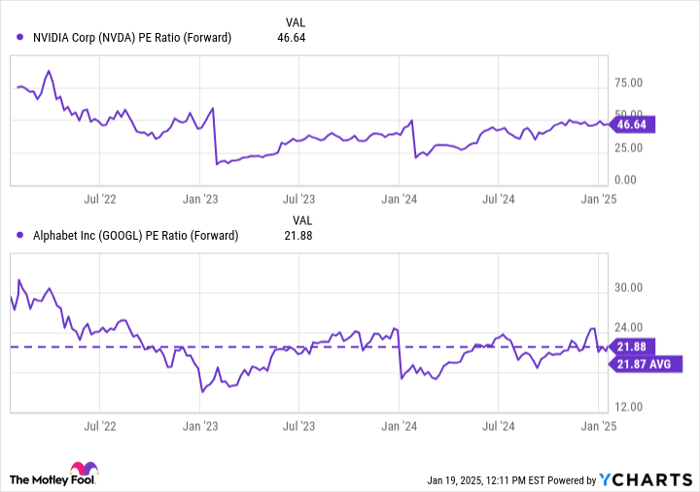For the past few months, quantum computing stocks such as IonQ, Rigetti Computing, and D-Wave Quantum have garnered a lot of attention and witnessed pronounced run-ups in their share prices. The momentum each of these stocks is experiencing certainly makes the idea of quantum computing a tempting investment opportunity.
But as I've expressed previously, I'd caution from following the crowd when it comes to mainstream quantum computing stocks. Instead, I'd suggest turning to big tech -- and in particular, Nvidia (NASDAQ: NVDA) and Alphabet (NASDAQ: GOOG) (NASDAQ: GOOGL).
Where to invest $1,000 right now? Our analyst team just revealed what they believe are the 10 best stocks to buy right now. See the 10 stocks »
Isn't Nvidia just a chip company? And isn't Alphabet just an advertising behemoth? Believe it or not, both of these "Magnificent Seven" members are leading the charge in the quantum computing movement behind the scenes.
Let's explore how Nvidia and Alphabet are playing a role in quantum computing and assess if either of these stocks are good buying opportunities right now.
1. How is Nvidia involved in quantum computing?
Nvidia specializes in designing chipsets known as graphics processing units (GPUs). GPUs are the hardware that process algorithms and sophisticated computations that help train generative AI applications, such as large language models and machine learning protocols.
However, one aspect of Nvidia's business that is unique is its tight integration between hardware and software. The company also offers a software suite called Compute Unified Device Architecture (CUDA), which layers on top of Nvidia's hardware stack.
Within the CUDA ecosystem, Nvidia offers a tangential platform known as CUDA-Q that focuses specifically on quantum computing development. CUDA-Q is marketed as a "unified programming model." In simple terms, the CUDA-Q architecture allows for seamless integration between GPUs, central processing units (CPUs), and quantum processing units (QPUs), all in a singular platform.
Recently, the company announced that Google is leveraging CUDA-Q and H100 GPUs to power simulations that will help in designing the search giant's quantum computer. To me, the subtle idea here is that Nvidia continues to unlock opportunities for becoming both the primary hardware and software provider for major corporations, and their various explorations of AI products and services.

Image source: Getty Images.
2. How is Alphabet involved in quantum computing?
Although Nvidia remains the dominant force in semiconductors, it's important to note that many hyperscalers including Alphabet have been exploring developing their own chipware.
Back in December, Alphabet made a major announcement as it relates to its quantum computing ambitions. Specifically, Google Quantum revealed that its new quantum chip, dubbed Willow, was able to perform a computation in less than five minutes that would otherwise take today's most capable supercomputer 10 septillion years to figure out.
Are Nvidia and Alphabet stock good buys right now?
While Nvidia and Alphabet have made notable progress in the field of quantum computing, it's important to take a step back and consider some important details.
For example, even though Alphabet's Willow chip possesses immense processing power, does figuring out a problem that would take 10 septillion years really matter right now? Personally, I think the answer is "no."
And while CUDA-Q appears to already have gained some impressive traction, I'd caution investors from buying into the idea that this specific part of Nvidia's business will make a meaningful financial impact anytime soon.

NVDA PE Ratio (Forward) data by YCharts.
Right now, Nvidia is trading at a forward price-to-earnings (P/E) multiple of 46.6. Notably, this is much lower than the company's forward P/E from even just a few years ago. Considering Nvidia is a much different business today and consistently generates record growth across sales and profits, the current contraction in valuation multiples suggests Nvidia is not only reasonably priced, but it could be seen as cheap right now.
In a similar fashion, Alphabet's forward P/E of 22 is identical to its three- and five-year averages. I think investors may be discounting Alphabet's potential given the fierce competition the company faces in advertising from Meta Platforms and TikTok, and the challenging market dynamics in cloud computing, which is currently dominated by Amazon and Microsoft.
I think concerns surrounding Alphabet are misaligned. Despite various competitive landscapes, the company remains a dominant force online thanks to Google Search and YouTube, and its cloud computing platform is swiftly becoming Alphabet's next big generator of accelerating cash flow.
At the end of the day, I think both Nvidia and Alphabet are stocks to buy hand over fist -- but not necessarily because of quantum computing. While I think quantum computing could become a major contributor for both businesses at some point, I think there are more clear near-term catalysts underscored by other pockets of the AI realm that will influence their respective growth.
Should you invest $1,000 in Alphabet right now?
Before you buy stock in Alphabet, consider this:
The Motley Fool Stock Advisor analyst team just identified what they believe are the 10 best stocks for investors to buy now… and Alphabet wasn’t one of them. The 10 stocks that made the cut could produce monster returns in the coming years.
Consider when Nvidia made this list on April 15, 2005... if you invested $1,000 at the time of our recommendation, you’d have $874,051!*
Stock Advisor provides investors with an easy-to-follow blueprint for success, including guidance on building a portfolio, regular updates from analysts, and two new stock picks each month. The Stock Advisor service has more than quadrupled the return of S&P 500 since 2002*.
*Stock Advisor returns as of January 21, 2025
Randi Zuckerberg, a former director of market development and spokeswoman for Facebook and sister to Meta Platforms CEO Mark Zuckerberg, is a member of The Motley Fool's board of directors. John Mackey, former CEO of Whole Foods Market, an Amazon subsidiary, is a member of The Motley Fool's board of directors. Suzanne Frey, an executive at Alphabet, is a member of The Motley Fool's board of directors. Adam Spatacco has positions in Alphabet, Amazon, Meta Platforms, Microsoft, and Nvidia. The Motley Fool has positions in and recommends Alphabet, Amazon, Meta Platforms, Microsoft, and Nvidia. The Motley Fool recommends the following options: long January 2026 $395 calls on Microsoft and short January 2026 $405 calls on Microsoft. The Motley Fool has a disclosure policy.
The views and opinions expressed herein are the views and opinions of the author and do not necessarily reflect those of Nasdaq, Inc.


